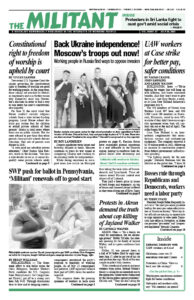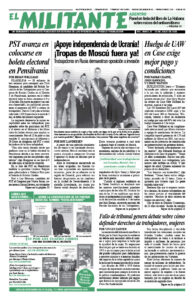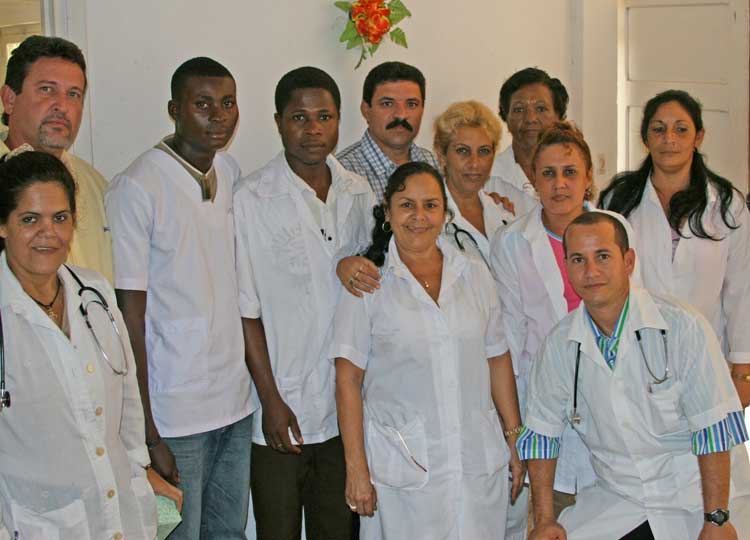One of Pathfinder’s Books of the Month for July is Capitalism and the Transformation of Africa: Reports from Equatorial Guinea by Mary-Alice Waters and Martín Koppel. The two joined a Militant reporting team there in 2005 and 2008, witnessing both changes in social relations as capitalist development gave birth to a working class, and also the impact of revolutionary Cuba’s internationalist volunteers. This excerpt is from the chapter “Cuban Medical Cooperation: The Internationalist Example of a Socialist Revolution.” Copyright © 2009 by Pathfinder Press. Reprinted by permission.
The medical cooperation between the Cuban and Guinean governments … aims to train Equatorial Guinean doctors and nurses who will work to transform public health care in their country. This is a principle guiding all Cuba’s medical missions in every country where they are invited to work. …
Such medical collaboration is an expression of the proletarian internationalist course that has marked Cuba’s socialist revolution for half a century.
In 1963 the very first Cuban medical brigade volunteered to go to Africa. They went to newly independent Algeria, less than a year after the French colonial regime had been defeated by the Algerian National Liberation Front in a long and bitter war.
That same year, Cuba responded to a request by Algeria’s workers and peasants government to send weapons and volunteer combatants to help deter an imperialist-backed assault by the Moroccan regime. Over the decades, Cuban internationalists have fought alongside anti-imperialist forces throughout Africa — from the Congo to Guinea-Bissau to Angola — as well as in Latin America.
That tens of thousands of Cuban medical personnel are today providing health care in the most hard-to-reach parts of countries the world over is one of the most demonstrative expressions of the socialist character of the revolution that Cuban workers and farmers carried out, overturning capitalist property relations and transforming the consciousness of millions. No other country in the world is capable of anything remotely comparable, nor does any other government want to do so.
As Cuban revolutionary leader Ernesto Che Guevara, himself a physician, explained and demonstrated by his own example, “To be a revolutionary doctor, you must first make a revolution.” In Cuba not only has health care — an expensive commodity under capitalism — become free and available to all as a basic right, but those who become medical workers are educated in that spirit.
As of 2008, more than 38,000 Cuban doctors, dentists, nurses, and medical technicians are working as volunteers in 73 countries, according to Cuba’s Ministry of Health. That includes 1,500 medical personnel in 35 African countries. Cuban personnel are responsible for medical schools not only in Equatorial Guinea but in Gambia, Guinea-Bissau, and Eritrea.
The Cuban medical brigade has been in Equatorial Guinea since 2000, [Brigade head Dr. Juan Carlos] Méndez told us, as part of the Comprehensive Health Program for Central America, the Caribbean, Africa, and Asia. That initiative had been launched by the Cuban government two years earlier in response to the destruction caused by Hurricane Mitch in Central America. “We sent emergency medical brigades to the region struck by the hurricane,” he said, and from there the program expanded to other parts of the world.
Today the 160 doctors, nurses, and lab technicians who make up the Cuban brigade in Equatorial Guinea are working in all 18 of the country’s districts — 57 of them on the island of Bioko and 103 on the continent. Except for those with special leadership responsibilities, who sometimes serve longer, brigade members generally work here for two years, with a one-month vacation at the end of the first year.
“The Cuban doctors go to every corner of the country, even to the most remote areas,” President Teodoro Obiang Nguema told us in an August 7 interview. “You can see the discipline and morale of those doctors.”
The living expenses of the Cuban medical workers are paid by the government of Equatorial Guinea. “We provide them with a stipend, housing, transportation, and other necessities,” Obiang said.
In addition to the minimal stipend — the same for all personnel, irrespective of qualifications — the Cuban government pays the Cuban medical volunteers their regular monthly salaries in Cuban pesos, giving that amount directly to their families in Cuba or depositing it in a bank account held for them until their return. Medical workers who have completed international missions receive 50 dollars a month in hard currency in addition to their salary in Cuban pesos. …
“Here we discovered a reality we ourselves had never encountered in Cuba,” said Dr. Laura Cobo. “We’ve seen preventable diseases we had previously only read about in books. We’ve seen children dying of malaria or dying of hunger.” Some of the doctors noted that many diseases common in Equatorial Guinea had ravaged working people in Cuba as well, before the socialist revolution triumphed in the early 1960s and began transforming social relations. Even the oldest of the brigade members, however, are generally too young to have experienced those capitalist conditions firsthand. …
Cobo said the hardest thing she’s had to get used to is that “health care here is a commodity.” In Cuba high-quality medical care is free for everyone. But here “patients have to pay for everything, from medicine to emergency operations. If they can’t pay we’re not supposed to treat them.”
Some doctors told us they find this so difficult to carry out that they not infrequently forget to tell patients they have to pay.
“This experience prepares us to work better on behalf of the Cuban Revolution,” Cobo said. “When we return home, we’ll be able to use these experiences — despite all the material shortages we face in Cuba — to explain the gains of the revolution,” to explain what a socialist revolution means.


